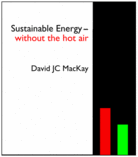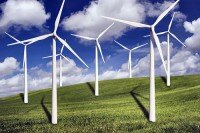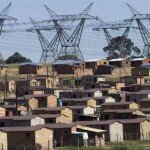Posted in Books on 01/08/2010 02:13 pm by Stephen Tindale

Anyone who cares about the survival of human civilisation should read this book. It is packed with facts and statistics about solutions, and shows that we must stop arguing about which is cheapest or best, because we need all of them.
read more »
Posted in Comment on 02/01/2010 09:54 am by Stephen Tindale
Last week, I went to Chile to take part in a conference about energy policy – mainly about whether Chile should build nuclear power stations. The current Chilean government has been discussing nuclear energy for the last three years, but has not said yes or no.
read more »
Posted in Comment on 11/01/2011 11:01 am by
Comment by Robert Webb on Dieter Helm’s claim that gas is a cheaper way to cut carbon emissions than renewables.
read more »
Posted in Comment on 04/10/2009 11:44 am by Stephen Tindale
Some good news – or at least good promises – from Gordon Brown. In his first interview since the G20, he told The Independent that this month’s Budget will make the UK “a world leader” in manufacturing, using and exporting electric and hybrid vehicles, and also lighter, more fuel-efficient petrol cars.
read more »
Posted in Comment, Repowering communities on 08/10/2010 10:57 am by Stephen Tindale
The UK Energy and Climate Secretary has announced that, from 18 August 2010, local councils will be allowed to sell renewable electricity. This is fast and impressive work.
read more »
Posted in Comment on 05/10/2010 10:07 am by Stephen Tindale
The world faces an urgent climate crisis. There is no time to lose. However, the UK general election has produced no winner and, at the time of writing, it is still not clear who will form the next government.
read more »
Posted in Comment on 11/10/2011 05:01 pm by
Robert Webb comments on the strengths and weaknesses of the ‘Energy Internet’ vision.
read more »
Posted in Comment on 01/11/2010 10:54 am by Stephen Tindale
The UK has enormous wind potential, and is already the world leader in terms of installed offshore capacity. However, it achieved this with only 688Mw of operational offshore wind farms.
read more »
Posted in Comment on 06/11/2009 04:05 pm by Stephen Tindale
The need to reduce greenhouse gas emissions is usually referred to as ‘decarbonisation’. Jonathan Porritt, the chairman of the UK Sustainable Development Commission, thinks that it is better to call it “re-solarisation”, because this is positive and solar power has immense potential.
read more »
Posted in Comment on 10/12/2010 02:07 pm by Stephen Tindale
The South African government has published an energy plan which proposes a decline in the use of coal and six new nuclear power stations. The country is not short of coal, so the government should be commended for exploring alternatives.
read more »
Posted in Comment on 12/13/2013 02:41 pm by Stephen Tindale
Friday the 13th – and reasons to be gloomy about UK energy policy
read more »
Posted in Comment on 07/14/2009 08:02 pm by Stephen Tindale
On Monday, 13 July 2009, Ed Miliband, the UK Energy and Climate Change Secretary, opened the Little Cheyne Court wind farm in Kent. With a capacity of just under 60Mw, this is the largest wind farm in South East England.
read more »
Posted in Comment on 05/14/2009 11:11 am by Stephen Tindale
“Climate change is the biggest global health threat of the 21st century.”
These are the opening words of an editorial and also a major report published this week in the Lancet and University College London Institute for Global Health Commission.
read more »
Posted in Comment on 07/15/2016 09:01 am by Stephen Tindale
The UK no longer has a department with the words ‘climate change’ in its title. Climate policy is now the responsibility of a new Department of Business, Energy and Industrial Strategy. This could be seen as a downgrading of climate action – and has been condemned by some green groups. But I think it is […]
read more »
Posted in Comment on 01/16/2012 12:41 pm by Stephen Tindale
Global investment in renewables and energy efficiency increased 5% to $260 billion in 2011, according to Bloomberg New Energy Finance.
read more »
Posted in Comment on 07/17/2009 07:33 pm by Stephen Tindale
On Wednesday 15 July 2009, the UK government published its plan to make the UK a low carbon economy. It is good on electricity, quite good on energy efficiency and heat, but bad on transport.
read more »
- Tags: carbon capture, carbon tax, CCS, CHP, climate change levy, coal power, decarbonisation, energy efficiency, fuel poverty, nuclear power, renewables, statistics, wind power
Posted in Comment on 11/17/2009 08:27 am by Stephen Tindale
Presidents Hu and Obama met today in Beijing and climate change was high on the agenda. China and the US are now the two largest producers of greenhouse gas emissions, responsible for over a third of total annual global emissions – though the US has caused 30% of the total historical contribution, whereas China has contributed just 7%, and US per capita emissions are 23.5 tons, whereas China’s are 5.5 tons.
read more »
Posted in Comment on 04/18/2010 03:04 pm by Stephen Tindale
The manifestos of the three main UK political parties, Conservative, Labour and Liberal Democrat, all agree that climate change is an extremely serious issue and that tackling it can be done in ways which enhance energy security and strengthen the UK economy.
read more »
Posted in Comment on 01/18/2017 08:45 am by Stephen Tindale
Last week the former energy minister Charles Hendry published his review on tidal lagoons (https://hendryreview.wordpress.com/) I am a consultant to Tidal Lagoon Power (TLP), so not disinterested. But I think that anyone reading the report will recognise it as an extensive, evidence-based and therefore serious review. Hendry was in my view a good energy minister […]
read more »
Posted in Comment, Policy on 11/19/2015 09:57 am by Stephen Tindale
UK climate and energy policy are not perfect, but are in significantly better shape this morning than they were yesterday morning
read more »
Posted in Comment on 07/20/2009 02:47 pm by Stephen Tindale
Opponents of nuclear power often claim that supporting nuclear will inevitably mean that renewables will suffer. However, the evidence from France shows this need not be the case.
read more »
Posted in Comment on 05/06/2015 10:08 pm by Suzanna Hinson
Analyses what the parties standing UK-wide are promising to do about climate change.
read more »
Posted in Comment, Policy on 06/24/2015 09:03 am by Stephen Tindale
Key quotes from, and a few of my comments on, the excellent Lancet Commission report
read more »
- Tags: 'cap-and-trade', carbon tax, CCS, coal power, decarbonisation, energy efficiency, EU, nuclear power, Public health, renewables, solar power, wind power
Posted in Comment on 08/21/2009 06:10 pm by Stephen Tindale
Spain and South Africa both have lots of coal, but no significant oil or gas. Yet their responses to the energy security issues this raises have been dramatically different.
read more »
Posted in Comment on 03/24/2010 09:58 am by Stephen Tindale
Last week, the Norwegian government announced that it is on track to meet its new renewables target for 2011. On the face of it, this isn’t significant. However, Norway is significant on climate change and has played a major role in climate policy for many years.
read more »
Posted in Comment on 06/25/2009 12:54 pm by Stephen Tindale
On 24 June 2009, the UK government announced that the UK aims to have installed 33Gw of offshore wind by 2020, generating a quarter of the UK electricity needs. But it won’t be cheap.
read more »
Posted in Comment on 04/26/2012 12:41 pm by Stephen Tindale
Germany is planning several new coal and gas power stations – without CCS – to replace its nuclear stations. This is bad for the climate and also a waste of money.
read more »
Posted in Comment on 01/26/2010 12:24 pm by Stephen Tindale
Yesterday, I attended a talk by Pat McFadden, a minister in the UK’s Business Department, about how the UK should move to a low-carbon economy. His main point was that the UK is still a manufacturing economy, despite the common view that everything manufactured is now imported. He also talked about the enormous opportunity for people in the UK to make wind turbines.
read more »
Posted in Comment on 05/26/2009 12:10 pm by Stephen Tindale
China now emits 18% of total global greenhouse gases. This is the same as the USA – possibly more. So, it is obviously essential to engage the Chinese people, government and businesses over climate control. But this doesn’t mean that China and the US (or Europe) are equally ‘responsible’.
read more »
Posted in Comment on 12/27/2011 02:17 pm by Stephen Tindale
The European Commission should focus on proposing specific policies, rather than modelling different scenarios. It has done well with its energy efficiency proposal; now it should propose strengthening the ETS and setting a 2030 renewables target.
read more »
Posted in Comment on 10/27/2015 07:49 am by Jon Trevelyan

A post by Melody Waterworth on energy in Ghana, where she is currently volunteering.
read more »
Posted in Comment on 02/28/2011 04:59 pm by Stephen Tindale
By the end of 2010, China had 41.8Gw of wind capacity installed. This grew by an impressive 62% in 2010.
read more »
Posted in Comment on 05/28/2009 07:29 pm by Stephen Tindale
The UK has reduced total greenhouse gas emissions since 1990 by 15%. However, this has not primarily been achieved by government policies introduced to protect the climate.
read more »
Posted in Comment, Repowering communities on 10/28/2010 11:19 am by Stephen Tindale
This week, I was taken on a tour of properties owned by Islington Council. Islington is an area of London with many council home. The borough council was run by the Liberal Democrats until May 2010. However, in the local elections, it reverted to Labour control – it has been run by Labour for most of the last few decades. The Liberal Democrat leader, Terry Stacy, was personally very committed to action on climate and fuel poverty, and the new Labour leader, Catherine West, appears to be the same.
read more »
Posted in Comment on 12/03/2009 09:53 am by Stephen Tindale
Yesterday I went to Brussels for a seminar on CCS with Ruud Lubbers, who used to be prime minister of the Netherlands and is now running the Rotterdam Climate Initiative.
read more »
Posted in Comment on 04/30/2010 06:47 am by Stephen Tindale
The Obama Administration has given the go ahead for a 468Mw wind farm in Nantucket Sound, off the coast of Massachusetts. This will be the US’s first offshore wind farm and has been delayed in the planning process for almost a decade.
read more »
Posted in Comment on 12/31/2009 03:35 pm by Stephen Tindale
The lack of substantial progress at Copenhagen, though not unexpected, has left many people close to despondency on climate change. There is now a serious danger that they will lose interest. More worrying is the danger that the media will lose interest, leading to politicians doing likewise.
read more »
Posted in Comment on 08/04/2009 11:35 am by Stephen Tindale
Russia produces 5% of annual global greenhouse gasses and is responsible for 8% of the historic contribution. Its per capita annual emissions are about 14 tons, compared to 12 in Germany, 11 in the UK and 5.5 in China (but 24 in the USA).
read more »
Posted in Comment on 08/04/2010 10:51 am by Stephen Tindale
This week, the 25km cable to connect the Wave Hub to the grid – effectively a giant socket into which wave machines can be plugged – is due to be laid.
read more »
Posted in Comment on 03/05/2010 03:03 pm by Stephen Tindale
On Wednesday and Thursday, I attended a conference on renewable energy in Scotland, on the stunningly beautiful island Skye. I talked about how to dispel myths about climate change and renewables.
read more »
Posted in Comment on 11/05/2010 08:17 am by Stephen Tindale
Courts have put injunctions on the Spanish government’s plans to subsidise Spanish coal. This is welcome. Subsidies should go to coal with CCS, and to renewables.
read more »
Posted in Comment on 12/07/2009 02:54 pm by Stephen Tindale
The Copenhagen Climate Summit starts today. Prospects are looking better than they were a few weeks ago and the fact that President Obama has decided to attend the final negotiating session, rather than just for a token visit at the start, is excellent.
read more »
Posted in Comment, Policy on 12/07/2015 09:30 am by Stephen Tindale
The advance represented by Energy and Climate Secretary Amber Rudd’s ‘reset’ speech on 18 November has been pretty comprehensively destroyed by Chancellor George Osborne.
read more »
Posted in Comment on 01/07/2010 11:00 am by Stephen Tindale
Scotland has immense potential to expand renewables, particularly wind and the Scottish National Party (SNP), when it took over the Scottish government in 2007, set a target that half of all Scotland’s electricity should come from renewables by 2020.
read more »
Posted in Comment on 10/07/2011 07:03 am by Stephen Tindale
The EU has long prided itself on leading international efforts to control climate change. Today, the issue is nowhere near the top of the EU’s agenda, having been eclipsed by the economic downturn and the eurozone debt crisis.
read more »
Posted in Comment on 02/08/2010 11:29 am by Stephen Tindale
2009 is in danger of being remembered as the year of the Copenhagen ‘failure’ and Obama’s failure to get a cap-and-trade bill through the US Senate. However, it should be remembered as a year when, despite extremely difficult economic conditions, major polluting countries made substantial progress in expanding wind energy.
read more »
Posted in Comment on 10/08/2010 08:55 am by Stephen Tindale
It isn’t often worth commenting on the fact that an agreement has been signed. Too many politicians make too many promises about what they plan to do in the future. However, a co-operation agreement between the US, the world’s top polluter, and Iceland, the world leader on geothermal energy use, is an exception.
read more »
Posted in Comment on 04/09/2010 08:52 am by Stephen Tindale
We try to be optimistic and positive at Climate Answers; to emphasise what we support rather than what we oppose. However, that doesn’t mean that there aren’t things to oppose and condemn, and yesterday’s decision by the World Bank to give a $3.75 billion loan for a coal power station in South Africa is certainly one of them.
read more »
Posted in Comment on 07/09/2009 04:53 pm by Stephen Tindale
Yesterday, the G8 countries promised to cut their greenhouse emissions by 80% by 2050, and to limit global warming to no more than two degrees centigrade. This is better than nothing but less than is needed.
read more »
Posted in Comment, Policy on 04/22/2015 03:41 pm by Suzanna Hinson
The EU should not buy electricity from countries with highly-polluting coal power stations, and should instead support efficiency and clean energy in these countries.
read more »
- Tags: biomass, carbon capture, CCS, CHP, coal power, decarbonisation, energy efficiency, nuclear power, renewables, solar power, wind power
Posted in Behaviour, Policy, Technology on 03/13/2009 05:30 pm by Stephen Tindale

Our website, Climateanswers.info, is broadly split up into three: technological answers, political answers and behavioural answers.
Why have we done this?
Well, this site is really about actions and not prohibitions – what we can do, rather than just what we shouldn’t. We do not wear hair shirts at Climate Answers and we are born optimists!
read more »
- Tags: 'cap-and-trade', biochar, carbon, carbon capture, electric cars, emission trading schemes, fiscal reform, nuclear power, organic food, solar power, wind power
Posted in Policy on 08/27/2009 11:56 am by Stephen Tindale

The Labour Party came to power in 1997 committed to devolving powers to Scotland and Wales, and re-creating a London-wide government. It was also determined to improve the political situation in Northern Ireland and was willing to use devolution to achieve this. Therefore, the last 12 years have seen considerable change to the constitution of the UK. Climate change was not a driving force behind any of this, but, nevertheless, the new tiers of government have had significant impact on what the UK is doing.
read more »
Posted in Policy on 04/17/2010 05:53 pm by Stephen Tindale

All three main UK parties take climate seriously and promise to reduce emissions and expand low-carbon energy. They all recognise the energy security and employment benefits. This article includes quotations from the relevant parts of the manifestos of the three main parties on heat and electricity – energy efficiency, fuel poverty and energy production.
read more »
Posted in Policy on 01/04/2010 02:25 pm by Stephen Tindale

Germany led the world on wind energy until 2007. In 2008, it was overtaken in terms of total installed capacity, though not percentage of energy coming from wind, by the USA. It remains the world’s top photovoltaic (PV) installer, accounting for almost half of the global market in 2007 – though this generates only about 1% of total electricity used in Germany.
read more »
Posted in Technology on 12/09/2009 09:48 am by Stephen Tindale

No form of electricity generation is entirely free of carbon emissions. So just how carbon free are the main types?
read more »
Posted in Comment, Policy on 03/28/2015 07:30 pm by Stephen Tindale
Climate campaigners should be more pragmatic and more prepared to make compromises. Pragmatism often delivers progress; idealism rarely does.
read more »
Posted in Policy, Technology on 03/05/2010 03:01 pm by Stephen Tindale

There are several myths or misunderstandings that have grown up surrounding climate change and renewable energy. Both sides of the debate can be at fault. This article tries to debunk some of nonsense that is often cited as fact.
read more »
Posted in Comment, Policy, Technology on 10/23/2015 08:57 am by Stephen Tindale
The Committee on Climate Change sensibly calls for an ‘all of the above’ approach to decarbonisation.
read more »
- Tags: air quality, biofuel, biogas, biomass, CCS, decarbonisation, electric cars, energy efficiency, EU, nuclear power, renewables, solar power, tidal power, wave power, wind power
Posted in Policy on 01/18/2010 06:55 pm by Stephen Tindale

How well have Obama and Energy Secretary Chu done so far on promoting energy efficiency, renewables, CCS and electric vehicles? A very positive assessment is made by the Center for American Progress.
read more »
Posted in Policy on 11/16/2009 04:58 pm by Stephen Tindale

This article reviews the climate performance of different US states and is mainly based on Climate Change 101: state action published by the Pew Centre on Global Climate Change and on State of the States 2008: Renewable Energy Development and the Role of Policy published by the US Department of Energy’s Renewable Energy Laboratory.
read more »
Posted in Answers to your questions, Technology on 07/29/2009 02:19 pm by Administrator

I agree that wind and nuclear energy are not intrinsically opposed to each other. However, France only has wind power because it’s forced to by the European Union.
David Walters
read more »
Posted in Repowering communities on 06/21/2010 10:09 am by Stephen Tindale

I am writing a book, with Prashant Vaze and Peter Meyer on the role that local, regional and state governments should play in increasing energy efficiency and promoting low carbon energy. This will be published by Earthscan in 2011.
read more »
Posted in Repowering communities on 09/08/2010 05:15 am by Stephen Tindale

Community-owned renewables are quite rare in the UK, but extremely common – mainly wind farms – in Germany and Denmark. The UK is at least now moving in the right direction, albeit slowly.
read more »
Posted in Repowering communities on 06/25/2010 02:40 pm by

This is a case study of the Gigha community-owned wind farm in Scotland, carried out by Simon Dresner. Comments are welcome.
read more »
Posted in Policy, Technology on 04/30/2009 12:00 am by Stephen Tindale

The ANC government has connected 80% of all South Africans to the electricity grid – one of its greatest successes. However, this mass electrification programme, combined with strong economic growth and rapid industrialisation, meant that demand for power outstripped supply in early 2008.
read more »
Posted in Comment, Policy, Technology on 01/25/2017 09:47 am by Stephen Tindale
The low-carbon energy sectors – efficiency, most renewables, CCS and nuclear – should work together more strategically
read more »
- Tags: biomass, carbon capture, CCS, CHP, decarbonisation, energy efficiency, nuclear power, renewables, solar power, solar thermal, tidal power, wind power
Posted in Policy on 04/27/2009 12:36 pm by Stephen Tindale

Despite the grim economic context, the UK Government managed to find some extra money to help control climate change.
read more »
Posted in Comment on 05/11/2015 08:31 am by Stephen Tindale
Tory manifesto indicates no major change in energy policy, with exception of end to subsidy for onshore wind. But UK engagement with EU energy union looking less likely.
read more »

















